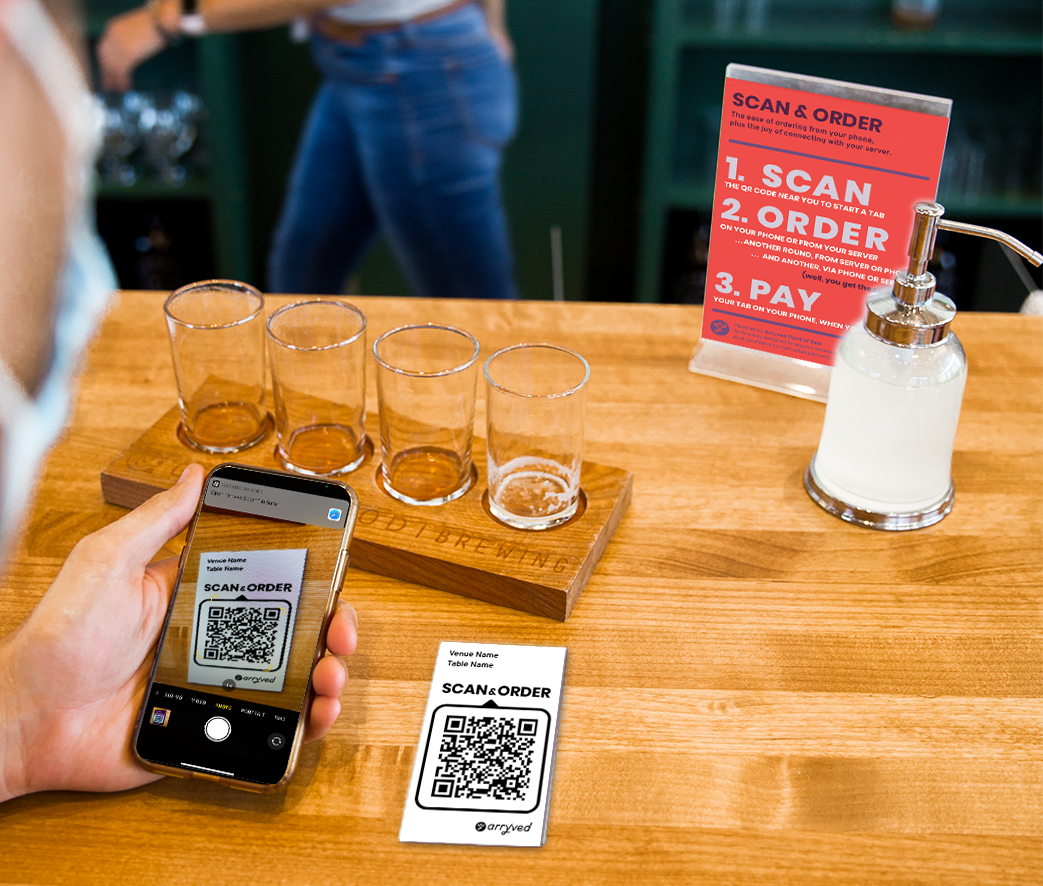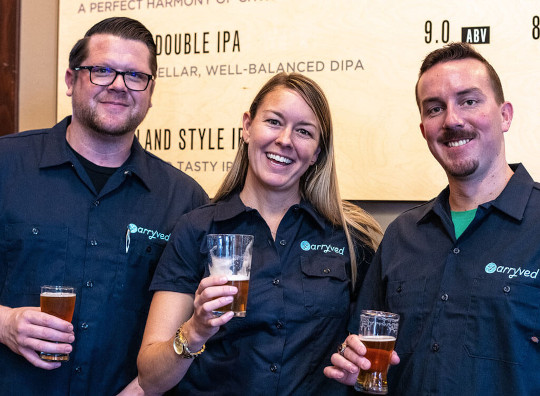8 Features to Look for When Considering a POS System for Your Bar and Restaurant
Here are the top 8 pieces to look for in a POS system for your bar and restaurant. Remember that your POS system should work for you, saving you time, money, and headaches.
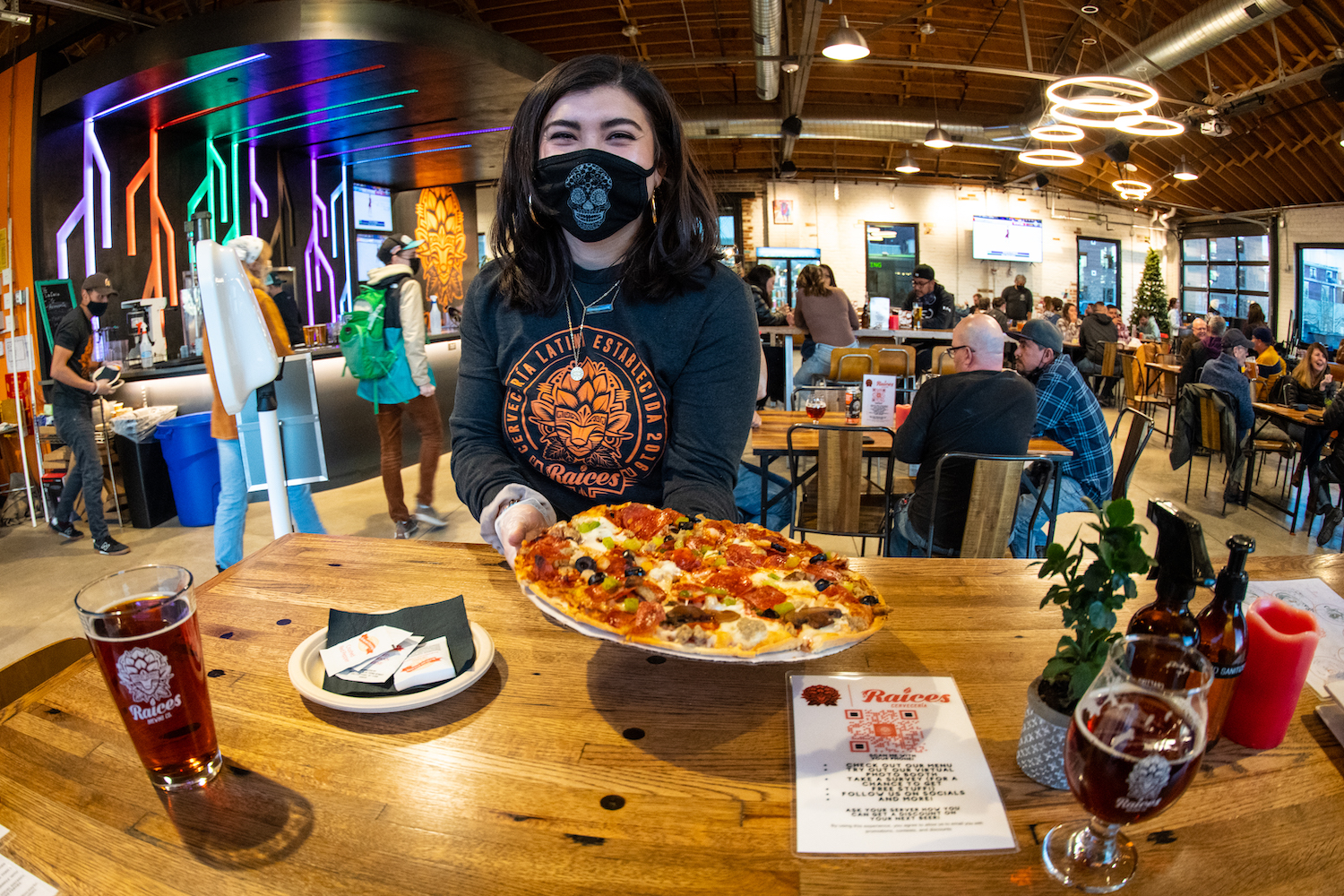
If you’re in the business of serving eaters and drinkers, chances are you require a robust point of sale (POS) system to support your day-to-day operations. There are a lot of options out there available, all different flavors, so it’s key to hone in on the essentials.
We’ve compiled this list of 8 features to look for when considering a POS system for your bar and restaurant:
1. Easy To Use
This one is self-explanatory: you need an easy-to-use interface for both your guests and staff. There’s no need for anything complicated, and no reason you’d want to hinder anybody’s use with your point of sale.
Another key feature is that your POS allows for digital, real-time synchronization across all devices—guest devices, staff devices, and your management devices. Imagine being able to look at how your Saturday night sales are going from the comfort of your home! That’s one of the many benefits of having all your data synced.
Pssst, data geeks—more on inventory synchronization and reporting to come!
2. All-In-One Management Tools
You’re the boss, and you need to have your ducks in a row at all times. Your POS system for your bar and restaurant should be your secret weapon when it comes to managing all the little things you need to think about.
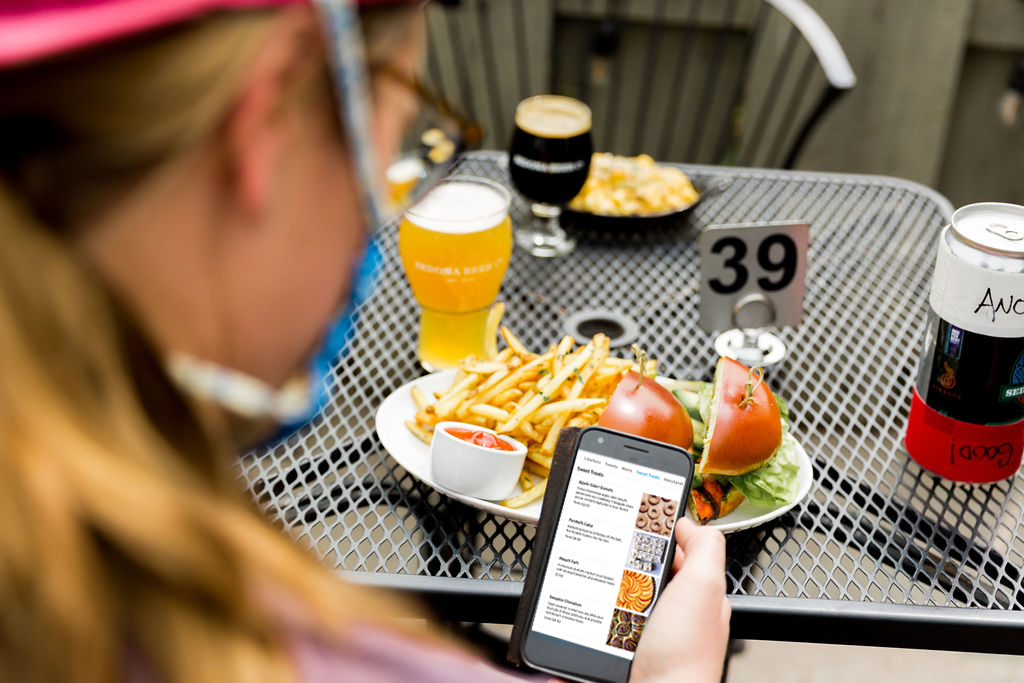
Table and venue management
Your bar or restaurant likely has specific areas of space (patio, main dining room, pool table lounge, etc.) and each venue may need to be managed differently. Your POS should support you with different tools and functionality based on what table and where it is in your establishment. Table-specific QR codes should also be organized within your point of sale—but more on that later!
Employee management
Your restaurant and bar staff are like family, and your focus should be on building your relationships, instead of time-consuming tasks like managing scheduling. When hunting for a POS system for your bar and restaurant, keep an eye out for employee management tools that make it easy to set wages, give special permissions, split tips, and keep time. Insights on performance like which of your servers is selling the most are invaluable, too.
Inventory management
Here’s where your POS’s real-time synchronization across all devices comes in: managing inventory. Real-time inventory syncing across all of your points of service—POS devices, online store, and tabs on guest phones—is essential to delivering a great guest experience. Any server can tell you the worst feeling in the world is going back to a customer to let them know that the specific food they wanted is no longer available. They would also probably tell you that the tedious job of manually updating inventory is a waste of precious time!
So, make sure your bar and restaurant POS system keeps an always-up-to-date inventory system, so staff and guests only have access to what’s available the moment the order is being placed. Likewise, it should sync those tabs to your inventory, so it can deplete what’s still available in real-time, down to the ounce poured. That way, no awkward apologies required and your guests stay smiling.
Order management
Your front of house and back of house are in constant communication, and you should look for a point of sale that streamlines those conversations in order to maximize ordering efficiency. Gadgets like a kitchen display system are important tools to have so your restaurant kitchen has accurate and timely orders displayed right in front of them, all from one click in the front of house.
Payment management
Your staff is focussed on delighting guests with your delicious food and drinks, so the payment part of things shouldn’t cause any headaches. Your POS should make frequent guest requests, like splitting tabs or certain items, simple with a couple clicks.
Your POS system for your bar and restaurant should also support the functionality of comps and tags. Comps should be easily applied to an item if there was a mistake made, and tags should be able to be used to flag VIPs or members of specific events you’re hosting.
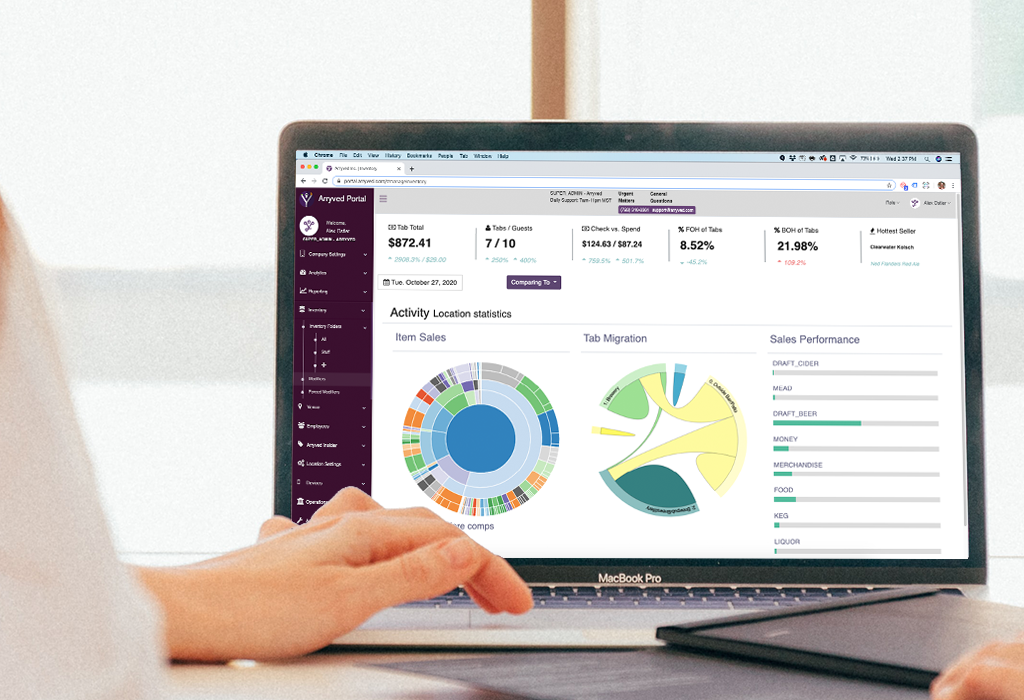
3. Reporting
First and foremost, you need a POS system for your bar and restaurant that understands the business you’re in. For example, if you own a brewpub, your POS must understand the layers of overhead and price realization by channel for beer-production. A POS that can look under the hood, help you discover hidden gems unique to your business, and use them for forecasting through tracking sales is really going to help you in the long run.
Because you’ve already narrowed down your search by POS systems with robust real-time data synchronization, the reporting should be comprehensive and updated in real-time as well. This should include:
- A dashboard that shows sales, inventory, labor, and profitability
- Peak performance by day of the week, holidays, and promotions
- Trends of sales vs. guests by day and top-selling item reports
- Order time (when staff are busiest) vs. sales time (when money is processed)
You should also be able to create custom reports and save them. Data matters a lot when you’re running a business, and a little number crunching goes a long way when it comes to determining your success.
4. QR Code Menus, Ordering, and Payment
No one is a stranger to QR codes these days, as they have become a permanent tech fixture in the dining experience as of 2020. It’s imperative, then, that your 21st century POS system for your bar and restaurant provides efficient QR code ordering, enabling customers to start a tab, order, and close out, all from their own device.
This is critical not just from a customer-service point of view—removing the friction of getting that first drink as soon as a customer sits down—but also from a management perspective. Data shows that tabs opened and ordered on guest devices are 25% larger than tabs opened and ordered on staff POS devices.
This type of seamless experience, where guests enjoy fast service and interact freely with staff delivering their orders, leaves guests happier and more generous, and allows staff to educate and wow, instead of tediously collecting orders from everyone in the restaurant.
Genuine, efficient service is a must in hospitality, and your POS should work with you to make that happen.
5. Security
This one is a no-brainer: With all the data and payments you’re collecting every day, your POS system must be secure. A secure hosting platform that you can trust ensures not only your company’s privacy is safe, but your customers’ information is too.
Here are some buzzwords you should keep an eye out for when you’re determining a POS’s security:
Payment Card Industry (PCI) Standards: the set of security standards used by card brands
Report of Compliance (ROC): industry audited security practices
Sensitive Personally Identifiable Information (SPII): information that can identify someone
You want your POS system for your bar and restaurant to exceed PCI standards in their yearly audits for PCI ROC. Make sure it’s encrypting all of the SPII, so no card data is ever exposed in transit or at rest. Embedding numerous checks and balances, and continuously reviewing them, will help assure any anomalies are acted upon, addressed, accounted for and corrected. Job number one is to help your company stay in the clear of any privacy or security violations when it comes to customers’ credit card information, so make sure your POS provides this protection for your business.
6. Marketing Capabilities
Your point of sale should do more than just be the middleman for orders and payments. What features are offered that make you excited to partner? Keep an eye out for fun features like these so your marketing efforts can have a heyday:
Loyalty program
There’s no better motivation than a simple point system that honors you for buying stuff you already love! Reward your existing fan base and broaden your network further with a simple loyalty program, as supported by your point of sale.
Ideally, the system should recognize customers through their credit card or profile associated with their account for their points to automatically accrue in their digital profile, without the need for a physical loyalty card or complicated redemption system. Promotions and prizes should easily integrate into the ordering process, so your servers can suggest selections that allow your guests to easily redeem their points. Collecting their information through your POS’s built-in loyalty program will also give you the opportunity to reach guests via email, online, or in person.
Your rewards members spend money to earn points, and then redeem them for discounts, free items, or VIP pre-orders of your newest release. Marketing like this is made easy with a dynamic POS system for your bar and restaurant.
Online store
Sales from an online store are the perfect way to capture revenue from customers who may not be typical in-person visitors. Especially with some people not comfortable dining in quite yet, having a platform where you can easily sell to-go orders, or even just gift cards for a later date, is key to staying top of mind for all types of your fans.
Your online store is a great place to showcase your fashionable merchandise as well. Incentivize your customers with a discounted merch on the bottom of receipts—your surrounding town will be rocking your hats in no time!
7. Pricing & Contracts
Pricing isn’t the be all and end all when determining which point of sale is right for you and your business, but it matters a whole lot. POS companies may try to sell you on their system with a flashy number that seems lower than most, but it’s imperative that you look into exact contractual obligations and fees that they may tack on after you’ve already signed. Most POS companies charge a monthly subscription fee that includes a limited range of features within the software, so make sure to dig into your all-in software fees in advance.
Here are some fees to look out for in a POS system for your bar and restaurant so you don’t fall into a nickel and diming trap:
Contractual time periods are what some software providers use to sell you on their service. They ask your team to sign a contract ensuring years of service and often lower the price for the longer the term. This period of time is usually negotiable, and sometimes the agreement can also not be included at all, so it’s worth asking. A trustworthy POS won’t lock you into a long contract, because they know the product and service they provide will be enough to keep you with them.
Onboarding fees are the extra costs POS companies charge to get you and your staff all set up with their system. The fee may be based on length of time it takes or the number of staff in attendance, but regardless, this is a fee to avoid. The last thing you want is to feel rushed in the onboarding process, or limit the number of people properly trained. Starting a new POS is a big transition, and you should feel supported instead of like it’s yet another expense.
Support fees can be charged every time you reach out to the POS team for help. Again, this is another fee you should avoid in contracts, because you don’t want to be limited in the amount of help you’re getting. Your day to day is too fast paced to have to worry about asking critical questions!
Fees per employee login are tricky to swallow because ultimately, it limits your growth. Employee logins are essential for you to manage staff and their work, and additional fees for each employee you add are an unnecessary blocker to your growing business.
Hardware is a cost that you should consider before signing on for any particular POS system for your bar and restaurant. But it’s not typically avoidable, nor is it something to try to avoid! Just ensure that the devices you’re buying are sufficient for your tech needs (read: high speed) and that there’s a reasonable return policy in place for hardware that poops out on you. You should also consider the cost to upgrade over time.
Additional feature fees are the snakes in the grass. There’s nothing like realizing the exciting feature announcement from your POS just means another line item on your monthly bill. New features are something your POS should be releasing to delight you and keep you onboard, not as a way to get more money out of you. Look for POS companies that aren’t charging you to access their additional bells and whistles.
Banking and credit card fees are a topic you should definitely bring up when in talks with the POS provider, because you may need to seek out a separate payment processor to get the best rates. There are minimal one-time fees associated for administrative reasons, along with your per transaction fees. When you’re talking to a POS provider, make sure to ask about their bank/service fee, interchange rate, and per transaction costs. Ask who takes responsibility for processing outages and back charges, and look for a partner who will keep your best interest in mind. These will help you see a more holistic view of what your company will be paying per month for a POS system for your bar and restaurant.
8. Customer Support
Good customer support is priceless, and your POS either has it, or doesn’t.
Comprehensive onboarding and training is vital when you’re making a point of sale transition. If you’re not properly trained by a friendly face on your new POS, you’re immediately starting off on a bad foot. Ask a lot of questions about what the onboarding and training process looks like for any particular POS. You can even ask to talk to an existing customer what their onboarding experience was like—it’s definitely important enough to get third party feedback on.
There are some things out of your control, and out of your POS’s control, like a storm that totally knocks out your internet. But it happens and not infrequently! Make sure to inquire what kind of support you would get in this situation. Offline mode would be music to your ears, of course, but there may be other sufficient ways to—quite literally—weather the storm.
Regardless of what comes your way, your POS should have your back. So on your busiest Saturday of the year, when your staff is already overwhelmed, you need to be able to reach a support member of your POS if there’s a problem. The ability to get someone on the phone at the drop of a hat separates a good point of sale, from being an amazing point of sale.
Go forth and POS hunt!
Now that you have your grocery list of what to look for in a POS system for your bar and restaurant, start the search! Remember that your POS system should work for you, saving you time, money, and headaches.
Let’s make this easy
Turns out Arryved may be just the point of sale to itch that scratch—schedule a free, customized demo.

